英语论文写作课复习资料(仅供参考)
- 格式:pdf
- 大小:58.72 KB
- 文档页数:20
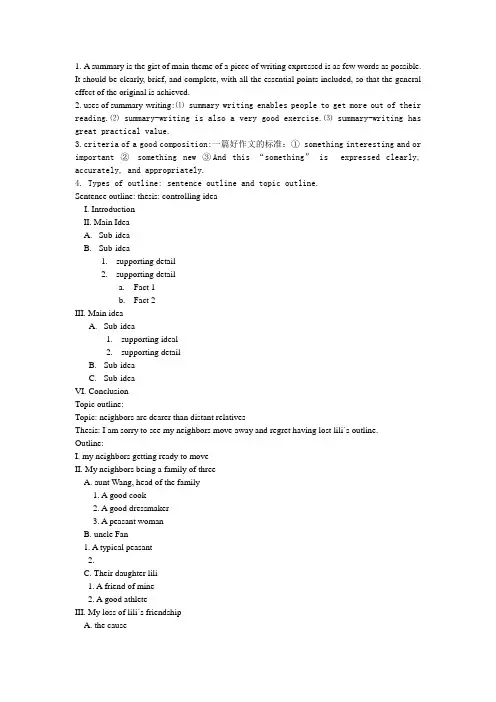
1. A summary is the gist of main theme of a piece of writing expressed is as few words as possible. It should be clearly, brief, and complete, with all the essential points included, so that the general effect of the original is achieved.2. uses of summary-writing:⑴ summary writing enables people to get more out of their reading.⑵ summary-writing is also a very good exercise.⑶ summary-writing has great practical value.3.criteria of a good composition:一篇好作文的标准:① something interesting and or important ②something new ③And this “something”is expressed clearly, accurately, and appropriately.4. Types of outline: sentence outline and topic outline.Sentence outline: thesis: controlling ideaI. IntroductionII. Main IdeaA.Sub-ideaB.Sub-idea1.supporting detail2.supporting detaila.Fact 1b.Fact 2III. Main ideaA.Sub-idea1.supporting ideal2.supporting detailB.Sub-ideaC.Sub-ideaVI. ConclusionTopic outline:Topic: neighbors are dearer than distant relativesThesis: I am sorry to see my neighbors move away and regret having lost lili`s outline.Outline:I. my neighbors getting ready to moveII. My neighbors being a family of threeA. aunt Wang, head of the family1. A good cook2. A good dressmaker3. A peasant womanB. uncle Fan1. A typical peasant2. -------------------C. Their daughter lili1. A friend of mine2. A good athleteIII. My loss of lili`s friendshipA. the causeB. the consequenceVI. My regret and the lesson I have learned6. Rules for writing outlines: to sum up, we should avoid single subdivis ions; avoid mixing sentences and phrases in an outline; make sure that subheads of the same rank ( for example, A, B, and C) are of equal importance, are related to the headings I, II, and III, and are arranged in logical order; and always write the thesis in one complete sentence.7:Three main parts of a composition: The Beginning, The Middle, The End.8: five aspects in a narrative: Purpose, Selection of detail, Context, Organization, Point of few. 9: Exposition:说明文包括:Illustrate, Comparison and contrast10: Comparison and contrast 的类型subject-by-subject pattern, point-by-point pattern.11: what is different Chinese notices and English notices? 1: In an English notice, the day of the week is writing before the date, but in a Chinese notice, the day of the week is generally put after the date. However, if the activity is to take place within the week, the day of the week often comes before the date in a Chinese notice: (周五(10月21日)下午。
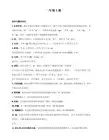
英语论文写作课复习资料(仅供参考)Lecture 1 General introduction1. The basic concept of academic research paper writingThe concept: “Research ”---something new, something of significance, something that can promote scholarship, science and technology, productivity and human growth, for thebetterment of the well-being of mankind.2. Characteristics of academic paperA. Scientific--- based on scientific theories and objective data, and the problem is approachedwith a scientific attitude and methodology.The conclusion is backed up by reliableevidence, the analysis or exposition is logically sound.B. Scholarly --- more or less theoretical and concerned with academic matters.The subjectunder discussion or investigation and the conclusion to be drawn are academicallysignificant.C. Original --- a new perspective or method, develops new arguments or conclusions,or evenmakes a breakthrough in a certain field.The graduation paper is a special form of academic paper characterized by being scholarly,scientific and original to the greatest extent possible.3. The style of academic writingA. Formal because it is written in standard language and in formal style devoid ofcontractions,ellipses,slangy words,vulgarisms,etc.B. Substantial because it deals with academically important and serious issues and is ofsubstance and length.C. Well-documented because it rigidly follows the rules of citation and documentation with allborrowed ideas or facts fully acknowledged in the notes and bibliography.4. The requirements of an academic paper.1) A scientific attitude,a rigorous study style, a creative mind, and a great courage toexplore unknown academic areas, discovering or solving problems in the academic orscientific fields.2)Basic knowledge of academic research--- its nature, value, and significance,essentialfeatures, techniques and methods,etc.To learn more about the academic circle and thesociety by searching through all sorts of reference materials originating in academic andsocial studies.3) To know about scholarship, such as how to find subjects to investigate, how to collectand evaluate source materials, how to develop their own ideas.5. Components parts of an academic paper1) English title and Chinese title of your paper2) Abstract both in English and in Chinese and key words3) Key words in English and Chinese4) Contents5) Introduction6) Materials and methods used in the research (theories, tools, approaches, etc.)7) Facts and figures in the analysis, pros and cons in the argumentation or points ofview in the exposition;8) Research results or findings;9) Conclusion.6. The steps of paper writing1) Choosing a topic: a tentative topic, a preliminary thesis statement2) Making a thesis proposal:3) Data collection and evaluation: a working bibliography4) Thesis formulation (presentation or statement)5) Organization of ideas;6) Writing and revising of the paper;7) Finalizing of the paper.Research paper writing are more often with starts and stops,setbacks and reverses,even dead ends, especially in the preparatory stages. It is only after constant efforts,repeated modifications and alternations that you come to a satisfactory end and get everything finalized.7. Start working on your thesis:1) Be clear about your aims and intention: what to investigate or research into, what to writeabout.2). Choose a good topic: a tentative topic, narrowing your focus only on one of the issues, toan appropriate topic, considering your capability, limit of time, limit of references you can find.You may begin by inquiring into what is known to people on a certain subject;then by making comparisons or contrasts and passing judgment,you perceive loopholes, inaccuracies,errors or fallacies;by analyzing the correct and the incorrect,you draw conclusions of your own and develop some new ideas or views on the topic under discussion.3) Reading: d oing extensive and intensive reading, evaluating source materials and takingnotes of important and relevant information or points of view in your reading. Sorting out useful materials you have collected and developing your ideas.4) Writing an outline: p lan the paper with great care and draw a good outline, organizingyour thoughts for the writing of the paper with unity,coherence clarity and accuracy.5) Follow the writing conventions and paper format strictly: a ttach carefully and correctlymade notes and bibliography to the end of the paper, documenting properly the sources you have made use of.6) Guard against plagiarism: making of notes and bibliography.Lecture 2 How to choose a topicTo choose a topic is the first step of preparation for your research and research paper writing.You must decide on what to research into and what to write about,namely,to discover the subject for your research and choose the topic for your research paper.1. The two broad types:Research areas may be divided into two broad types:theoretical and practical.The theoretical type is theory-oriented.The practical is application-oriented.Theory and practice always walk hand in hand,and in fact they are usually combined in papers,which may be more theoretical or practical.2. Academic areas for the English majors of our universityThere are five areas for research and confine your topics to English-related areas and subjects as listed below:1) The Area of Language studies (linguistics),including English morphology,syntax,semantics, etymology,rhetoric,stylistics,pragmatics,all branches of English linguistics and their comparisons with the Chinese counterparts;Pure language study of English on its structure and elements such as peculiarities,phonetics,grammar,vocabulary,discourse,comparisons of English dialects,Briticism,Americanism,Australianism, etc.2) Applied linguistics: English for Specific Purposes (ESP).Studies of ESP: TESL (Teaching English as a Second Language); TEFL(Teaching English as a Foreign Language),and any special know-how or expertise concerning English in use.Nowadays,language teaching and learning is becoming an independent discipline with its own theory and practice, including:a. To study psychological mechanisms of language teaching and learning;b. To study the methods of teachers’ teaching and students’ learning of the English language;c. To compare the acquisition of the mother tongue with that of a foreign language,discuss theimprovement and application of modem teaching approaches and facilities,or even make comments on and evaluate text-books in use,etc.If you want to be more theoretical,you can try any branch of linguistics and its application to language teaching and learning and the second language acquisition.3)Area of literary studies,including :British,American,Australian,Canadian.South-African literature,comparisons between them,and their comparisons with Chinese literature;To apply literary theories and critical methodology to the study of writers and works,literary trends and schools,literary periods,literary criticism, etc.4)The area of translation and practice,including theories and mechanics,written translation and oral interpretation;In the area of translation,you can research into:a. The origin and growth of translation practice and theory;b. Different theoretical schools and their doctrines on translation;c. Standards and criteria for the quality of translation;d. Methods and techniques for doing translation of various kinds;e. Teaching of translation as a basic language skill,etc.5) The area of cross-culture studies:Comparisons of religions,philosophies,educations(?),habits and customs of different countries and races,as well as means of intercultural communication.3.To choose topics1) First step to discover a subject in one area:a. You may use your personal experiences,for example,attending a lecture or a course;reading anewspaper,a journal,a book or a novel;watching a movie,a TV program and so on.b.You may also talk with others,your fellow students,your friends,and your teachers in particular,to get enlightenment.c. The most important thing for you to do is to get help from source materials,such as a table of contents,a book’s index,an encyclopedia article,headlines in periodical indexes,etc.After you have discovered the subject that suits you,you should further find a specific topic under the chosen subject.2) Three standards.a. Interesting to you.An interesting topic will give you great impetus for the successful fulfillment of your research.b. Significant or worthwhile.Your topic should have obvious or potential theoretical or practical value.c. Workable or manageable.An appropriate topic should be neither too broad,or too narrow.3) Difficulties in choosing a good topic:a. Not fully aware of what is really significant or valuableb. Difficult to subdivide the general subject he has discovered into topics of manageable sizeand complexity.c.The problems of a broad topic:The topic is too general, one on which it is hard to focus your study or to finish a paper of the required length within the stipulated time.The references available may be too many for you to finish reading within the allotted time.Too broad a topic should be narrowed down to a workable size.d. The problems of a narrow topic:a. The topic is too specific,hard to enlarge upon or develop your arguments about.b. It is usually trivial or insignificant.c.You can hardly find enough source materials or references to help in your research.Such atopic should be broadened accordingly.Therefore, choosing a good topic for research and research paper writing could be much more difficult than expected.The difficulty usually is not that the researcher is ignorant of what holds interest for him, but hard to have clear ideas.4) Judgments of the significance or value:Your awareness of the significance or value of the topic to be chosen largely depends on:a. What aspects of your topic have or have not been explored;b. What are the findings,old and new;c. What are controversies therein;d. What are the loopholes, inaccuracies, errors, fallacies.5)The appropriateness of the topic:a. The length of the paper as required, for example, your graduation paper required about4,000 words;b. The amount of time you can afford;c. The availability of information you need for the research;Taking these factors into account,you decide whether your topic is too broad,or too narrow.3.To adjust your topic1) Narrow down an abroad topic:If your initial topic is too broad,you can narrow it down by m oving step by step from a broad to a narrow and still a narrow topic until you get the suitable one:2) Broaden a narrow topicIf your topic happens to be too narrow,you can also seek help from the periodical indexes and your adviser,or broaden it step by step by reversing the narrowing process as illustrated above.In short, when choosing a topic, you have to consider the significance of your research, your audience or readers, your writing situation, the availability of source materials, and other relevant conditions, which all contribute to the success of your research and research paper writing.Remember to consult your tutor or supervisor for advice.Lecture 3 Preliminary Bibliography1.Making a thesis proposal1) Preliminary bibliography:1) find the references available.2) reading source materials;3) previous achievements of the subject your choose;2) To discuss with your tutor1)The topic→The titles of academic articles (a tentative title)2)The anticipated result (hypothesis)3) Write a proposal:a. What is the subject you have discovered?b. Why do you take interest in this subject?c. What methods do you intend to adopt?d. How are the source materials you have read or mean to read related to the subject?e. What is the relationship between the previous achievements of others and your anticipatedresults?f. What practical and/or theoretical value do you think your research might have?g. What are the limitations of your methods and materials,and the difficulties you maypossibly encounter?h. How do you plan to overcome these difficulties?The proposal gives the plan and the procedures you mean to follow, the background of the research, and discusses the anticipated results of your research in relation to the previous achievements of others and their potential value in theory and practice,as well as possible limitations of your research and difficulties you might meet with.2. Choosing methods and approaches.(注: 一定根据研究内容和题目确定研究方法。
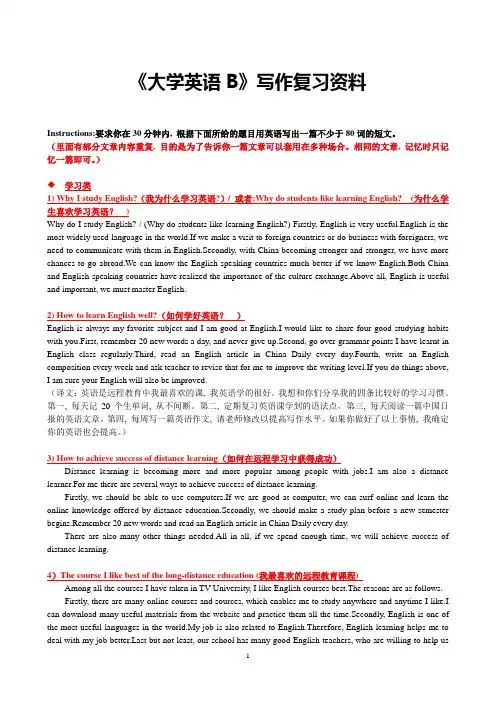
《大学英语B》写作复习资料Instructions:要求你在30分钟内, 根据下面所给的题目用英语写出一篇不少于80词的短文。
(里面有部分文章内容重复, 目的是为了告诉你一篇文章可以套用在多种场合。
相同的文章, 记忆时只记忆一篇即可。
)学习类1) Why I study English?(我为什么学习英语?)/ 或者:Why do students like learning English? (为什么学生喜欢学习英语?)Why do I study English? / (Why do students like learning English?) Firstly, English is very useful.English is the most widely used language in the world.If we make a visit to foreign countries or do business with foreigners, we need to communicate with them in English.Secondly, with China becoming stronger and stronger, we have more chances to go abroad.We can know the English-speaking countries much better if we know English.Both China and English-speaking countries have realized the importance of the culture exchange.Above all, English is useful and important, we must master English.2) How to learn English well?(如何学好英语?)English is always my favorite subject and I am good at English.I would like to share four good studying habits with you.First, remember 20 new words a day, and never give up.Second, go over grammar points I have learnt in English class regularly.Third, read an English article in China Daily every day.Fourth, write an English composition every week and ask teacher to revise that for me to improve the writing level.If you do things above, I am sure your English will also be improved.(译文:英语是远程教育中我最喜欢的课, 我英语学的很好。
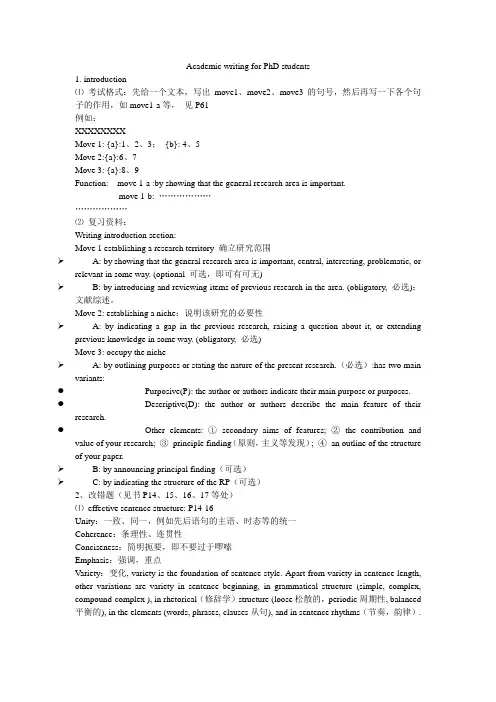
Academic writing for PhD students1. introduction⑴考试格式:先给一个文本,写出move1、move2、move3的句号,然后再写一下各个句子的作用,如move1-a等,见P61例如:XXXXXXXXMove 1: {a}:1、2、3;{b}: 4、5Move 2:{a}:6、7Move 3: {a}:8、9Function: move 1-a :by showing that the general research area is important.move 1-b: ………………………………⑵复习资料:Writing introduction section:Move 1 establishing a research territory 确立研究范围A: by showing that the general research area is important, central, interesting, problematic, or relevant in some way. (optional 可选,即可有可无)B: by introducing and reviewing items of previous research in the area. (obligatory, 必选):文献综述。
Move 2: establishing a niche:说明该研究的必要性A: by indicating a gap in the previous research, raising a question about it, or extending previous knowledge in some way. (obligatory, 必选)Move 3: occupy the nicheA: by outlining purposes or stating the nature of the present research.(必选):has two main variants:●Purposive(P): the author or authors indicate their main purpose or purposes. ●Descriptive(D): the author or authors describe the main feature of theirresearch.●Other elements: ①secondary aims of features; ②the contribution andvalue of your research; ③principle finding(原则,主义等发现); ④an outline of the structure of your paper.B: by announcing principal finding(可选)C: by indicating the structure of the RP(可选)2、改错题(见书P14、15、16、17等处)⑴effective sentence structure: P14-16Unity:一致、同一,例如先后语句的主语、时态等的统一Coherence:条理性、连贯性Conciseness:简明扼要,即不要过于啰嗦Emphasis:强调,重点Variety:变化, variety is the foundation of sentence style. Apart from variety in sentence length, other variations are variety in sentence beginning, in grammatical structure (simple, complex, compound-complex ), in rhetorical(修辞学)structure (loose松散的,periodic周期性, balanced 平衡的), in the elements (words, phrases, clauses从句), and in sentence rhythms(节奏,韵律).⑵correct use of numbers(数字的正确使用): P17-19①普通规则如果数据放在句首,一定要用单词,不能用数字:注意如果数字不能用少于四个单词表示,则不应放在句首(最重要的规则,必须遵守)在写作中,非特殊数据应根据以下两个规则写为单词:●数据小于100时,则写为单词●数据如果能用一或二个单词表示,则写为单词当数据出现在时间单位前,则应根据上面的规则来确定使用数字或单词:注意在技术写作中,不同过程的时间应用精确的数字来表示。
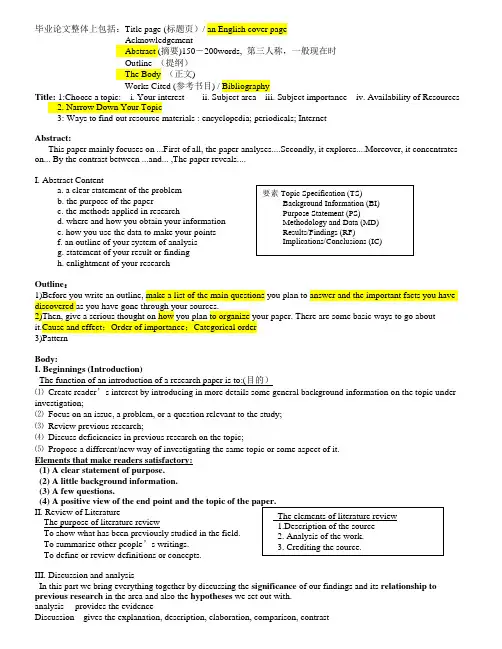
毕业论文整体上包括:Title page (标题页)/ an English cover pageAcknowledgementAbstract (摘要)150-200words, 第三人称,一般现在时Outline (提纲)The Body (正文)Works Cited (参考书目) / Bibliography Title: 1:Choose a topic: i. Your interest ii. Subject area iii. Subject importance iv. Availability of Resources2. Narrow Down Your Topic3: Ways to find out resource materials : encyclopedia; periodicals; InternetAbstract:This paper mainly focuses on ...First of all, the paper analyses....Secondly, it explores....Moreover, it concentrates on... By the contrast between ...and... ,The paper reveals....I. Abstract Contenta. a clear statement of the problemb. the purpose of the paperc. the methods applied in researchd. where and how you obtain your informatione. how you use the data to make your pointsf. an outline of your system of analysisg. statement of your result or findingh. enlightment of your researchOutline :1)Before you write an outline, make a list of the main questions you plan to answer and the important facts you have discovered as you have gone through your sources.2)Then, give a serious thought on how you plan to organize your paper. There are some basic ways to go about it.Cause and effect ;Order of importance ;Categorical order3)PatternBody:I. Beginnings (Introduction)The function of an introduction of a research paper is to:(目的)⑴ Create reader ’s interest by introducing in more details some general background information on the topic under investigation;⑵ Focus on an issue, a problem, or a question relevant to the study;⑶ Review previous research;⑷ Discuss deficiencies in previous research on the topic;⑸ Propose a different/new way of investigating the same topic or some aspect of it.Elements that make readers satisfactory:(1) A clear statement of purpose.(2) A little background information.(3) A few questions.(4) A positive view of the end point and the topic of the paper.II. Review of Literature The purpose of literature review To show what has been previously studied in the field. To summarize other people ’s writings. To define or review definitions or concepts.III. Discussion and analysisIn this part we bring everything together by discussing the significance of our findings and its relationship to previous research in the area and also the hypotheses we set out with.analysis ---provides the evidenceDiscussion---gives the explanation, description, elaboration, comparison, contrast要素Topic Specification (TS) Background Information (BI) Purpose Statement (PS) Methodology and Data (MD)Results/Findings (RF) Implications/Conclusions (IC) The elements of literature review 1.Description of the source 2. Analysis of the work. 3. Crediting the source.。
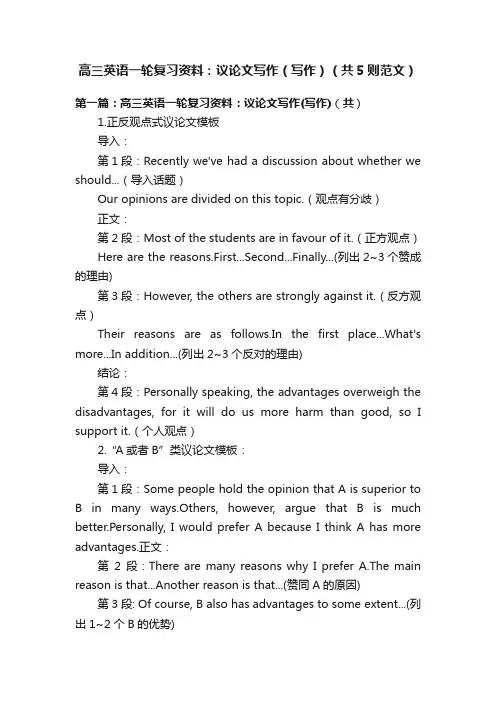
高三英语一轮复习资料:议论文写作(写作)(共5则范文)第一篇:高三英语一轮复习资料:议论文写作(写作)(共)1.正反观点式议论文模板导入:第1段:Recently we've had a discussion about whether we should...(导入话题)Our opinions are divided on this topic.(观点有分歧)正文:第2段:Most of the students are in favour of it.(正方观点)Here are the reasons.First...Second...Finally...(列出2~3个赞成的理由)第3段:However, the others are strongly against it.(反方观点)Their reasons are as follows.In the first place...What's more...In addition...(列出2~3个反对的理由)结论:第4段:Personally speaking, the advantages overweigh the disadvantages, for it will do us more harm than good, so I support it.(个人观点)2.“A或者B”类议论文模板:导入:第1段:Some people hold the opinion that A is superior to B in many ways.Others, however, argue that B is much better.Personally, I would prefer A because I think A has more advantages.正文:第2段:There are many reasons why I prefer A.The main reason is that...Another reason is that...(赞同A的原因) 第3段: Of course, B also has advantages to some extent...(列出1~2个B的优势)结论:第4段: But if all these factors are considered, A is much better than B.From what has been discussed above, we may finally draw the conclusion that...(得出结论)3.观点论述类议论文模板:导入:第1段:提出一种现象或某个决定作为议论的话题As a student, I am strongly in favour of the decision.(亮明自己的观点是赞成还是反对)The reasons for this may be listed as follows.(过渡句,承上启下)正文:第2段:First of all...Secondly...Besides...(列出2~3个赞成或反对的理由)结论:第3段:In conclusion, I believe that...(照应第1段,构成“总-分-总”结构)4.“How to”类议论文模板:导入:第1段:提出一种现象或某种困难作为议论的话题正文:第2段:Many ways can help to solve this serious problem, but the following may be most effective.First of all...Another way to solve the problem is...Finally...(列出2~3个解决此类问题的办法) 结论:第3段:These are not the best but the only two/ three measures we can take.But it should be noted that we should take action to...(强调解决此类问题的根本方法)第二篇:英语议论文写作模版议论文作文模板1.正反观点式议论文模板导入:第1段:Recently we've had a discussion about whether we should...(导入话题)Our opinions are divided on this topic.(观点有分歧)正文:第2段:Most of the students are in favour of it.(正方观点)The reasons are listed as follows.First...Second...Finally...(列出2~3个赞成的理由)第3段:However, the others are strongly against it.(反方观点) Here are the reasons.In the first place...What's more...In addition...(列出2~3个反对的理由)结论:第4段:Personally speaking, the advantages overweigh the disadvantages, for it will do us more harm than good, so I support it.(个人观点)オ2.“A或者B”类议论文模板:导入:第1段:Some people hold the opinion that A is superior to B in many ways.Others, however, argue that B is much better.Personally, I would prefer A because I think A has more advantages.正文:第2段:There are many reasons why I prefer A.The main reason is that...Another reason is that...(赞同A的原因) 第3段: Of course, B also has advantages to some extent...(列出1~2个B的优势)结论:第4段: But if all these factors are considered, A is much better than B.From what has been discussed above, we may finally draw the conclusion that...(得出结论)オ3.观点论述类议论文模板:导入:第1段:提出一种现象或某个决定作为议论的话题As a student, I am strongly in favour of the decision.(亮明自己的观点是赞成还是反对)The reasons for this may be listed as follows.(过渡句,承上启下)正文:第2段:First of all...Secondly...Besides...(列出2~3个赞成或反对的理由)结论:第3段:In conclusion, I believe that...(照应第1段,构成“总-分-总”结构)4.“How to”类议论文模板:导入:第1段:提出一种现象或某种困难作为议论的话题正文:第2段:Many ways can help to solve this serious problem, but the following may be most effective.First of all...Another way to solve the problem is...Finally...(列出2~3个解决此类问题的办法) 结论:第3段:These are not the best but the only two/ three measures we can take.But it should be noted that we should take action to...(强调解决此类问题的根本方法)实用文体写作模板高考英语作文经典范文名人名言No one can degrade us except ourselves;that if we are worthy, no influence can defeat us.(B.T.Washington, American educator)除了我们自己以外,没有人能贬低我们。

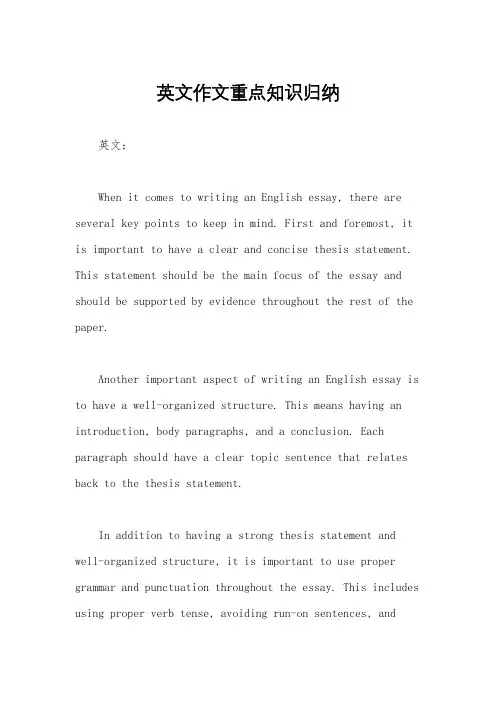
英文作文重点知识归纳英文:When it comes to writing an English essay, there are several key points to keep in mind. First and foremost, it is important to have a clear and concise thesis statement. This statement should be the main focus of the essay and should be supported by evidence throughout the rest of the paper.Another important aspect of writing an English essay is to have a well-organized structure. This means having an introduction, body paragraphs, and a conclusion. Each paragraph should have a clear topic sentence that relates back to the thesis statement.In addition to having a strong thesis statement and well-organized structure, it is important to use proper grammar and punctuation throughout the essay. This includes using proper verb tense, avoiding run-on sentences, andusing commas and other punctuation marks correctly.Finally, it is important to have a clear and concise writing style. This means avoiding overly complex vocabulary and sentence structures, and instead focusing on clear and concise language that effectively communicates your ideas.中文:写英语论文时,需要注意几个关键点。
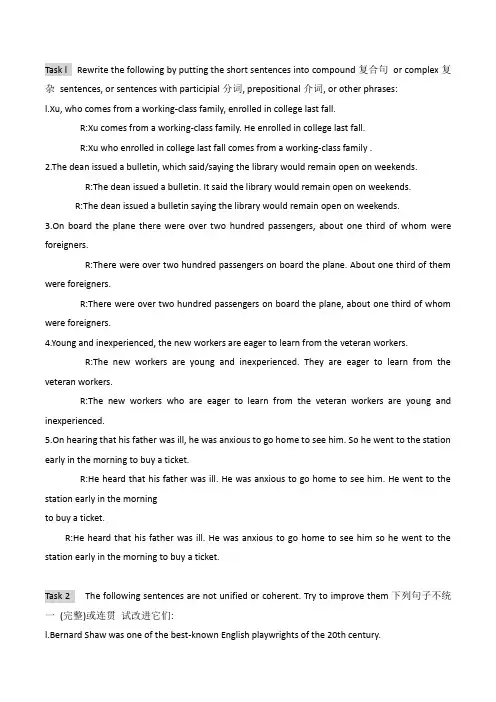
Task l Rewrite the following by putting the short sentences into compound复合句or complex复杂sentences, or sentences with participial分词, prepositional介词, or other phrases:l.Xu, who comes from a working-class family, enrolled in college last fall.R:Xu comes from a working-class family. He enrolled in college last fall.R:Xu who enrolled in college last fall comes from a working-class family .2.The dean issued a bulletin, which said/saying the library would remain open on weekends.R:The dean issued a bulletin. It said the library would remain open on weekends.R:The dean issued a bulletin saying the library would remain open on weekends.3.On board the plane there were over two hundred passengers, about one third of whom were foreigners.R:There were over two hundred passengers on board the plane. About one third of them were foreigners.R:There were over two hundred passengers on board the plane, about one third of whom were foreigners.4.Young and inexperienced, the new workers are eager to learn from the veteran workers.R:The new workers are young and inexperienced. They are eager to learn from the veteran workers.R:The new workers who are eager to learn from the veteran workers are young and inexperienced.5.On hearing that his father was ill, he was anxious to go home to see him. So he went to the station early in the morning to buy a ticket.R:He heard that his father was ill. He was anxious to go home to see him. He went to the station early in the morningto buy a ticket.R:He heard that his father was ill. He was anxious to go home to see him so he went to the station early in the morning to buy a ticket.Task 2 The following sentences are not unified or coherent. Try to improve them下列句子不统一(完整)或连贯试改进它们:l.Bernard Shaw was one of the best-known English playwrights of the 20th century.R:Bernard Shaw was one of the best-known playwrights.R:Bernard Shaw was one of the best-known playwrights of Britain in the 19-20tv' centuries.2.On the train I read the novel, which did not interest me at all.R:l read the novel on the train, which did not interest me at all.R:On the train I read the novel which did not interest me at all.3.On entering the room, no one was seen.R:On entering the room, no one was seen.R:On entering the room,l saw no one.4.Fred is an energetic and capable man you can rely on.R:Fred is energetic, capable, and a man you can rely on.R:Fred is energetic, capable and reliable.5.The children promised to be careful and return home early.R:The children promised to be careful and that they would return home early.R:The children promised they would be careful and return home early.Task 3 Revise the following sentences. Try to make them concise.复习句子尽量使它们简洁。
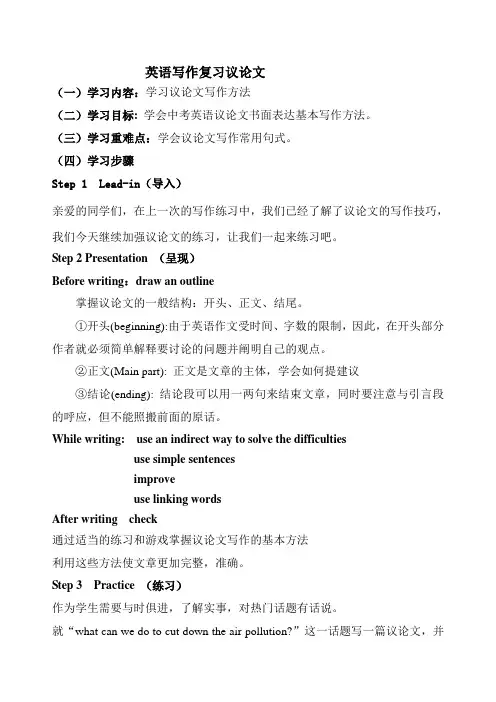
英语写作复习议论文(一)学习内容:学习议论文写作方法(二)学习目标: 学会中考英语议论文书面表达基本写作方法。
(三)学习重难点:学会议论文写作常用句式。
(四)学习步骤Step 1 Lead-in(导入)亲爱的同学们,在上一次的写作练习中,我们已经了解了议论文的写作技巧,我们今天继续加强议论文的练习,让我们一起来练习吧。
Step 2 Presentation (呈现)Before writing:draw an outline掌握议论文的一般结构:开头、正文、结尾。
①开头(beginning):由于英语作文受时间、字数的限制,因此,在开头部分作者就必须简单解释要讨论的问题并阐明自己的观点。
②正文(Main part): 正文是文章的主体,学会如何提建议③结论(ending): 结论段可以用一两句来结束文章,同时要注意与引言段的呼应,但不能照搬前面的原话。
While writing: use an indirect way to solve the difficultiesuse simple sentencesimproveuse linking wordsAfter writing check通过适当的练习和游戏掌握议论文写作的基本方法利用这些方法使文章更加完整,准确。
Step 3 Practice (练习)作为学生需要与时俱进,了解实事,对热门话题有话说。
就“what can we do to cut down the air pollution?”这一话题写一篇议论文,并请三名同学到黑板上写出开头、主体、结尾三部分常用表达方式Step 4 Check(互评)教师根据黑板上的合成作文进行点评,适当提示,寻找差距,这既能使学生学到优秀习作的写法,并能提高自己对现行中考短文改错题目的解题能力,在该项目获取高分。
根据中考的书面表达评分标准,小组成员之间互相评分,当堂讲评,肯定优点和亮点,找出问题。
Step 5 Homework目前,考试作弊现象严重,请结合此现象谈谈产生的原因,以及个人的看法和建议。

英语学术论文写作30题1. In the introduction of an academic paper, which of the following is the best way to attract readers' attention?A. Presenting a long list of previous studies.B. Starting with a controversial statement.C. Using complex sentence structures.D. Describing personal experiences.答案:B。
解析:选项 A 呈现一长串以往的研究可能会让读者感到枯燥;选项 C 使用复杂的句子结构可能会增加读者的理解难度;选项 D 描述个人经历在学术论文引言中不太常见。
而选项 B 以有争议的陈述开头能够激发读者的兴趣和好奇心,从而吸引他们的注意力。
2. When elaborating the research background in the introduction, which of the following should be avoided?A. Citing recent and relevant studies.B. Overemphasizing minor details.C. Explaining the significance of the research.D. Connecting the research to existing theories.答案:B。
解析:选项 A 引用近期相关研究是必要的;选项 C 解释研究的重要性有助于突出研究价值;选项D 将研究与现有理论相联系能体现研究的科学性。
而选项B 过度强调次要细节会使重点不突出,分散读者注意力。
3. Which of the following is an appropriate opening sentence for the introduction of an academic paper?A. "This paper will discuss an important topic."B. "In recent years, there has been a growing interest in this field."C. "I have always been interested in this subject."D. "The aim of this study is to solve a long-standing problem."答案:D。
Chapter 1 Defining the Dissertation You are asked to write a term paper,a library paper,a review,or a book review in order to demonstrate that you have learned the necessary skills of a general academic ability in the subject taught during the semester.How to define the terms like thesis,dissertation,paper(all be translated into Lun wen论文) vs their relationship.Dissertation is used to refer to "a long essay that you do as part of a degree or other qualification"that you are studying for -that is,a BA or an MA. Thesis is used to refer to "a long piece of writing,based on your own ideas and research that you do as part of your university degree,especially a PhD. So if the assay is part of a BA or MA degree,we call it a dissertation,if a part of a PhD degree we call it a thesis.You write an essay for a certain course during your university studies,we it a paper.BA dissertation学士论文,an MA dissertation硕士论文,a PhD thesis博士论文, term paper论文.Here is in line with the British educational tradition.In America,thesis means a BA lun wen or MA lun wen. Dissertation means a PhD lun wen. thesis,dissertation, and paper,their writing process is more or less the same,the major difference between them lies at the level of originality.Difference and relationship between a summary of information (easier to prepare)and an evaluation of information(include a summary).Academic writing,term paper or research article can aim at summarizing other's studies in the field and presenting the ideas or arguments put forward by other scholars.By contrast,a dissertation or thesis requires more than an acknowledgement of existing studies,it must involve a critical evaluation of research information and this is where the originality of the study lies. When summarize existing studies in the field,you are expected to present to the reader what you have read,how much you have understood,the way you organize all the information.When expected to evaluate previous studies,you must show ability in understanding ,commenting in a scholarly way,consider what factor,how and why factors.A dissertation involves both summarizing and evaluating other's studies in this field,this part of the work is called Literature review.The process of writing a dissertation,steps:we need a kind of yo-yo approach (go backward and forward)proposed by Sorenson ,do not think research process is direct or straightforward.Writing a dissertation is going through a process of doing research.3 steps in process:1.prewriting 2.writing 3.editing and completion.Chapter 2 Basic Writing and Academic WritingTwo types of writing(different genre types and reflect different level of difficulties):1.Basic Writing or practical writing (every day writing and all of us do it)2.Academic Writing(only required in an academic environment)Purpose of Basic Writing:help students learn to write well for everyday purpose,focus is on general writing skills and strategies.Different types of essays:narration,description,exposition,argumentation.Precis writing:(abstract the main points of an essay ,report,book). It is similar to the writing of summaries(the condensation of information)Academic Writing is concerned with academic research.1.Fictional writing (poems,essays,novels)2.non-Fictional writing1.Popular(writing in popular magazines)the major difference between popular and professional writing is that they have different groups of target readers.2.Professional(writing in Professional magazines)A.Technical writing(concerned with practice-based,problem-oriented or application-based research,it is usually written by and for engineers or practitioners for a pragmatic reason)B.Academic writing (based on original research ,concerned with theory-based or theorizing research and is usually written by and for academics)Difference:A comes from research with the application of a theory ,B develops from theorizing.B :Academic writing1.literary writing (concerned with the analysis and appreciation of literary works)2.non-literary writing(a type of scientific writing, scientific research methods are often used in this type)Difference :1 is more subjective, 2 is objective2.Non-literary writinga. Speculative(writings in a university's department of philosophy) speculative-orientedb. Experimental(writings in a university's department of psychology) experimental-oriented Seyfer ,H.&Wu,G.H.Style and mechanicsStyle: the way you present your ideas in your writing.In academic writing,the style is expected to be formal and scholarly ,not to entertain,but to inform to describe or to argue(avoid the use of slang,colloquial words and biased language,your tone and attitude to topic should be serious).The use of pronouns:it is the third-person pronoun he,she,they rather than the first-person pronoun i,me,my,or mine.because use of third-person pronoun suggests subjective opinions and weaken the assertion by implying uncertainty.But the use of impersonal labels such as t he researcher or the writer may distance oneself from what one is saying.As with basic writing,correctness is important mechanistic aspect as we pay attention to grammar,punctuation and other technical matters.If you find a misspelled word in a text you want to quote directly,insert sic.eg.Systematic (sic)functional linguisticUse abbreviations wisely,eg.Systemic Functional Linguistics(hereafter SFL)Chapter 3 Data,Analysis,and Research ParadigmsIn linguistic studies,as Widdowson points out,there are 3 sources of linguistic data.1.introspection(based on the linguist's own intuitive competence of the language.This method is popular because linguistic description can be based on the linguist's introspection.)2.elicitation(members of the speech community are asked to serve as informants to decide whether or not certain description are correct ,accurate or acceptable,eg, questionnaires and interviews)Both introspection and elicitation can be used to obtain data from 2 different sources:1.linguistic competence(abstract knowledge of language) municative competence(communicative use of language)3.Observation(the idea that behaviour ,eg,language use ,can be observed naturalistically, get examples from the corpus)Use which source depends on what you claim the data are evidence of ,and what you are trying to explain.2 Methods/ways of data collection:1.the data collected experimentally (the type of data yielded by the investigation is likely to be quantitative,i,e,information in the form of numbers)2.the data is collected non-experimentally (the type of data yielded by the investigation is likely to be qualitative ,i,e,information in verbal form)The way of looking at and analysing the data depends on the type of data that has been collected.1.Data for research is in quantitative form,use mathematical and statistical manipulations to process and analyse the data.2.Data in qualitative form,analyse the data in verbal formType of analysis :With experimental method and quantitative data,the result can be processed statistically.By contrast,non-experimental method and qualitative data,the result is usually interpretative.Grotjahn ,2 pure research paradigms:1.the exploratory-interpretive paradigm(employs a non-experimental method,yield qualitative data,and provides an interpretive analysis of that data)2.The analytical-nomological paradigm(the data is collected through an experiment and yields quantitative data,which are subjected to statistical analysis )There are 6 mixed paradigms.Types of research:Brown---1.primary research2.secondary research(consist of summarizing previous studies ,reviewing the literature in a given area,and synthesizing the research undertaken by others .Library research and literature review belong to secondary research)Primary research differs from secondary research in that it is derived from the primary sources of information.Primary research:1.qualitative studies (main focus is on making sense of the meanings of psychological ,social,linguisticand other phenomena, collecting accounts is one method.It is popular in discourse analysis and other text-based studies)2.survey studies(Data obtained from surveys can be either descriptive or explanatory ,It is designed to investigate a group's attitudes,opinions or characteristics through questionnaire --ask closed questions or open-ended questions and interview-ask a participant or informant for information about a particular research question,the questions can be tightly or loosely focused)3.statistical studies(comprise quasi-experimental studies and experimental studies.It based on experimental studies,which control the conditions under which the behaviour or phenomenon under investigation is observed)Chapter4 Prewriting (1):Developing the Subject1.Managing your timeKnowing how to manage your time effectively and make a realistic plan is a very important factor in determining your chances of success.When allocate the time,remember to set aside at least 2 days for emergency occasions.2.Locating your interestYour interest in the subject will make you eager to know more of the subject area and that will help a lot in the investigation of the research topic.Choose one subject interests you most,and then you must narrow down the subject area.3.Selecting a topic(How?--consult your tutor,read dissertations completed in previous years and available in your university library.Neither topic too broad or too limited or specialized)2 important factors to take into consideration when choosing a suitable topicA.manageabilityB.the availability of resourcesChapter5 Prewriting(2): Reading the LiteraturePurpose: Help you learn how to obtain information(Where you can get useful and relevant information for your research. How to read the existing literature. How to develop a working bibliography.)Familiarize yourself with the research background:Ways of widening your knowledge of the research topic and the other background information.A traditional way :1.Library research.(to the university library and check the catalogues by 1.subject search 2.keyword search 3.author search 4.title search / find CD-ROM reference materials ,the e-library can provide information and Corpora is used.)e the Internet selectively and wisely. 3.follow existing approaches to the problem by reading papers dealing with similar problems.Discovering existing studies <ways of getting background information>1.Search # in <http://www.baidu/>2. Consult a grammar book.(start with the index/table of content)3. Search <> 中国期刊全文数据库 3. A web page maintained by the British Council </grammar /archive/>Reading the relevant literature:Locate - readThey should read selectively(some read in detail,some read in genera)While reading and digesting other's ideas,you have 3 stages to go through.1.Understand as much as you can and follow the train of thought provided by the author. 2.Critically read and identify the strong points and weak points or areas to be further explored. 3. Decide on how to use the existing writing.Taking notes(a important step in preparing for your dissertation writing, because you quote and paraphrasing or summarizing previous studies )2 ways of taking notes: 1. Write useful ideas ,quotations on note cards(traditional, Direct quotation,Summary,Outline form) 2.record notes by using a computer(new) You must record correctly and check carefully whether it is correctly copied.Advantage of taking notes by computer: I n due course you can transfer the quotations directly into your dissertation without having to recopy them. Disadvantages :you may have difficulties in sorting out the quotations according to meaning or inserting the related quotation in the appropriate place. Discovering questions and problems:By looking at the existing studies,can easily find that there are many questions and problems that need to be further investigated.Focusing on your research:you can have a thorough study if your topic is not too broad.Preparing a working bibliography(the name implies the bibliography that you will be working with until your final draft has been submitted and accepted.)The entries条目of references in the working bibliography must be listed in an alphabetical order.If the reference is a book,you should have the author, title,publisher, place of publication, year of publication,s ource of the item. Use one format and follow it all the time.Chapter 6 prewriting (3)Thesis Formulation and Research QuestionsThesis :1.A thesis is an idea or theory that is expressed as a statement and is discussed in a logical way.论点2.A thesis is a long piece of writing ,based on your own ideas and research that you do as a part of a university degree.论文Thesis formation论点形成Thesis statement 论点陈述:also called the statement of the problem /the thesis sentence(states or suggests the research subject or the main topic,making thesis statement can help you focus on the research topic and avoid reading unrelated materials--clarify your thinking .In many cases,a thesis statement is also stated in the form of a problem that you attempt to solve in your research,in which case the thesis statement is a statement of solution to the problem.)The research question:the answer to the question or the hypothesis itself is in fact the thesis statement The research topic can be stated as a question (stimulate exploratory research)or as a hypothesis(the research focus is on a tentative explanation or argument that your research attempts to test)The research method(obtain data by observation ,searching the existing corpora available )In describing the research method,one can say that is data-driven or data-based and t he method can be qualitative rather than quantitative or qualitative and quantitative.Chapter 8 writing (1) : Elements of a DissertationThe Macrostructure……The abstract:is the first source of information, which gives the reader a general idea of your research and writing. The abstract serves as a summary of the research from which the reader gets a bird's-eye view of the whole dissertation.Elements in the abstract :1.subject matter/area 2.background information 3.purpose of the present study 4. Method5.findings 6. Implications.The introduction:1.rationale原理阐述for the research(or background to the research,reason/motivation) 2.aims and objectives 3.research questions 4.data 5.research method 6.theoretical framework 7.structure of the dissertation.The function of this rationale for the research is to orientate the reader by guiding him to the proposed study.Structure of the dissertation gives the reader a macrostructural view of the whole dissertation.\The literature review(a part of the secondary research)Purposes :1.show what has been previously studied in the field and what can be improved or modified 2.summarize other people's writings 3.to define or review definitions and key concept 4.clear the ground for your own research.The theoretical framework:The theoretical basis of your research. To outline the theoretical framework is to situate your research.Research method and data:discussion on 1.materials or data 2.design of the research 3.analysis 4.procedureAnalysis and discussion:the relationship between them (the analysis provides the evidence and the discussion gives the explanation and interpretation). If you have evidence (the linguistic phenomenon)but cannot discuss it in a justifiable way,people will challenge the usefulness of the analysis. If your explanation and interpretation are not based on analysis and evidence,people will challenge the objectivity of your research.The conclusion:get a general idea of the research. Purposes :1.bring the discussion to a close 2.summarize your research findings 3.discuss implications of the study 4.make suggestions for further studies.Chapter 9 Writing (2):Organizing ideasThe language of the elements of structure:the language in the introductory chapter serves the function of introducing the reader to the topic of discussion or focusing on the topic.(the first sentence's function is to state the purpose and the scope of the research)--aim,purpose,concernedReferring to previous studies(this is a way to show that the researcher is aware of the research background and the present research situation)Purposes:1.survey the research situation 2.follow other's research traditions 3.get theoretical support……3 ways of referring to previous studies:1.by quoting directly or indirectly 2.by paraphrasing other's words 3.by summarizing other's ideas.One way to avoid quoting a long passage is to break it into smaller parts so that it does not give the reader the impression of letting someone else do some of your writing for you.Ignoring the existing literature implies you are not familiar with the research situation ,not quote other's work suggest that the researcher is not aware of what has been done in the field.Summarizing:unlike quoting and paraphrasing,which retain more or less the same number fo words ,summarizing involves shortening the original passage by keeping the main points.Re-organizing ideas:One way to avoid put other's words directly into writing: re-organize the ideas by integrating them into a coherent whole. 2 ways:1.quoting only when necessary 2.illustrating the ideas with examplesAdvice on quoting:when you do not have access to the original source,you can quote as the other author did,to pretend that you have come across the quotation by yourself.Advice on the choice of reporting verbs:argue, assume, believe, characterize, claim,describe, explain,indicate,observe, point out ,report,reveal,show,state,suggest,write.Chapter11 Avoiding Plagiarism避免剽窃Definition :Plagiarism is "the use of another person's ideas or wording without giving appropriate credit"Two types of Plagiarism:1.intentional (the writer knows that he is copying other people's ideas,opinions,or language deliberately without thinking of giving acknowledgments,it's stealing,serious.)2.unintentional(the writer does not cite the source correctly.unconscious or accidental. So it is important for you to learn how to cite the source correctly.)The temptation to plagiarize Reasons :1.taking existing ideas and wording from the literature is much easier than organizing and proposing your ideas and writing in your own words.2.when you cannot meet the deadline.3.they synthesize a number of papers on the same topic and the result becomes their own writing."clever".The cost of plagiarism:immeasurable.it may ruin a person's career or reputation or even his life.people can become discredited when be accused of committing plagiarism.Paraphrasing vs plagiarism:If you need to quote or summarize or paraphrase other people's ideas or words,do this selectively and wisely. EXEMPLE:change grammatical structure and propositional meaning of passages.How to avoid plagiarism? Method:use an introductory clause or phrase to introduce other people's ideas or wording, to indicate the source of information.(As is observed by Liu /as is pointed out by Liu...According to Widdowson/' interpretation/ As widdowson interprets it...,,"....")this is better because the source of the information is clearly indicated by the use of introductory words.we can give due credit to the authors,provides all necessary information aboutthe source of ideas. Use our own language can successfully integrated the ideas into an appropriate context by paraphrasing.Advice :1.Quote other people's ideas if you need to or have to,but always do so properly,selectively and wisely. 2.Never try to pretend that you are not aware of the existing literature and ideas.Chapter 13 References and AppendixesFunction of documenting sources:to acknowledge your indebtedness ,to credit your sources,to lend greater credence to your argument,to establish the validity of your research,to provide the reader with additional bibliographical information.Preliminary bibliography,which is a working bibliography ,defined as something you will be working with until the final version of your writing has been submitted and accepted.Reference and bibliography,both refer to a list of books ,article reference works,etc.that have been used or referred to in the dissertation.A bibliography can also include books,articles.periodicals that are not used or referred to in a book,dissertation,etc..in which case reference cannot be used instead.Different styles of referencingSorenson 5 styles: 1.the APA(American Psychological Association)style2.the MLA(Modern Language Association)parenthetical style3.the MLA endnote style4.the MLA footnote style5.the MLA numbered styleThe APA style requires citation of documentation source within the text (the body of the dissertation) not endnotes尾注or footnotes脚注. The author's surname姓(the last name),the date of publication ,etc.,may be put into the text itself or within parentheses圆括号Use a consistent documentation style throughout the dissertation.Chapter14 submission and EvaluationWorking with your tutor cooperatively who not only helps you in the writing of the dissertation but is also the first person to evaluate your writing. Your tutor's responsibility is to guide you. You go to your tutor to report on the progress of your research and should be well-prepared.You learn to make good use of your tutor,knowing your tutor and his approach to helping students is also very important.Do nor give your work to the tutor for comment or revision at the last minute,before the deadline. Work out a plan with your tutor.Submission:when your tutor is pleased with your copy,you can submit. Before submit the dissertation to the department office,you must check the details which are concerned with the requirements set out by the university regulations.(any pages missing,whether is the last line of the page,page numbers). Once submitted,it is too late to make any modifications because it is going through another stage_the evaluation of your work.Evaluation criteria:The tutor has the responsibility of quality control,the comments on your dissertation given by your tutor have a important role to play, the tutor's opinions will influence the examiners in the committee.3 basic ways of (criteria for ) evaluating a dissertation: 1. The first criterion is mechanical in nature.(concerned with questions such as whether it meets requirements set out in the university regulations,the length,number of words,plagiarism).The second and third ways are mainly concerned with the members of the examination committee of your dissertation. One way is to look at the content,the meaning,the idea,etc. to see whether the dissertation has reached the level of a BA dissertation in terms of the content. The other way is to look at the form,the expression and presentation of ideas to see whether the student has written in an academic manner.The dissertation defence论文答辩The duration of a BA dissertation is about 30 minutes,here are steps:1.presentation of 10 minutes 2.the committee members ask questions 3.discuss and evaluates both dissertation itself and the oral examination,the candidate's performance during the presentation and the question-answer interaction.How to perform well:1.be familiar with what he has written in the dissertation. 2.be able to answer appropriately the questions raised by the examiners.If the examiner is challenging your ideas,you try to justify your points ,do not agree with everything he says nor argue with him. Keep calm and have a positive attitude.。
学术文章:Features on the lexical level:词汇上的特征①Terminology ②Nominalization ③Abbreviation ④Use of single verbsFeatures on the syntactical level 句法特征①Long complex sentenceFor accuracy to explain coplicated ideas clearly and precisely②Simple-present tenseDescribes natural phenomena, processes and makes explanation vivid and timeless③Passive voiceconvince the reader of the objectivity of the desciption④Non-finite verbsparticiples, infinitives and gerunds are freqently used in EST1:Why do you engage in scientific research ?Reasons to Engage in Scientific Research:(1)Personal interest to explore the world (2)Solving practical problems(3)Career development (4)Technological development(5)Academic exchanges (6)Academic evaluation (7)Being forced to2:What are the types, the structure and the characteristics of academic paper ?In terms of disciplines, they can be divived intoThree large categories: (1)Philosophy(2)natural science (3)social science.In accordance with a combination of the content, target, methods and other factors.①Argumentative papers ②Descriptive papers③Academic Meeting/Research Reviews ④Book ReviewsCharacteristics of Academic WritingEnglish for science and technology(EST) refers to the style used in scientific and technological activities. Their features are:(1)Objectivity(2)Clarity(3)Coherence(4)Accuracy4:Structure of a DefinitionA definition consists of three elements:(1) the term itself, (2) the category the term belongs to, (3) the features of the term.5. Criteria of a Good Definition1. Follow rules that have traditionally been given for definition.2. State the essential attributes of that which is defined.3. Give examples of usage.4. Avoid circularity.5. Must be neither too broad or too narrow nor leave out any appropriate information, nor include that which does not truly apply.6. Must not be obscure.7. Should not be stated in the negative when it can be stated positively.6:Principles of Title SelectionValue Principle Scientific Principle Innovative Principle Feasibility Principle7:Methods for Choosing a TitleIn general, there are six main methods for choosing a research title.(1) Consult your professor or an expert (2) Participate in academic conferences(3) Select from puzzling problems (4) Read books and newspapers(5) Choose from your own interests (6) Do literature reviews7:Standards for Good Titles(1) Accuracy Word choices should be accurate and reflect the actual situation.(2) Brevity Using the most succinct text possible to summarize the contents.(3) Clarity The title should clearly reflect the subject of the paper.8:Writing Formats for TitlesTitles are usually written in the following three formats:①All the letters of the title are capitalized;②The first letter of each content words of the title is capitalized;③The first letter of the title is capitalized.8:Some widely observed guidelines for the use of tables are:①The table should be self-contained.That is, it can stand alone face to face with the paper.②A table is usually placed in a position near its relevant description.③Provide each table with a number (Table 1, Table 2, etc.) and a title.④The title should be clear, concise, complete and accurate. Try to use descriptive words, not abbreviated forms.⑤The title of a table or diagram most commonly follows the same three methods as given above for the paper title.⑥The format of the column title. The first letter of the first word and proper nouns are capitalized, other words are in lowercase.⑦Notes of table. To explain the column title, abbreviations, symbols and data, add notes or footnotes at the bottom of the table.⑧Do not repeat information in a table only if it presents new information.⑨It is easier to compare numbers by reading down a column rather than across a row.9:Data collection and selection usually follow four principles:(1)Centered around the theme (2)True and verifiable (3)Typical (4)Novel 10:Three Important Steps for Data Collection and Evaluation(1)Understand types of resources. (2)Critically read and evaluate those resources.(3)Take notes effectively.10:Four important dimensions in critical thinking and reading:(1) Structure (2) Purpose (3) Audience (4) Author11:Common criteria used to access the information found on the Internet:(1) Authorship (2) The publishing body (3) Point of view or bias(4) Referral to and/or display of knowledge of the literature(5) Accuracy or verifiability of details (6) Currency12:Criteria for evaluating accuracy:评估确定性的标准(1)For a research document, the data and the research method(s) are included.(2)The methodology is appropriate to the topic and allows the study to be duplicated for purposes of verification. The document relies on other sources or includes links to the documents themselves.(3)The document names individuals and/or sources that provided non-published data used inthe preparation of the study.(4)The background information that was used can be verified for accuracy.13:Criteria for currency:精度的标准(1)The document includes the date(s) at which the information was gathered.(2)The document refers to clearly dated information.(3)Where necessary, the document includes information on the regularity of updates.(4)The document includes a publication date or a “last updated”date.(5)The document includes a date of copyright.(6)If no date is given in an electronic document, you can view the directory in which it resides and read the date of latest modification.14:Functions of an OutlineOutline can be helpful to show the hierarchical relationship or logical ordering of information.15:Reasons for creating an outline:(1)Aids in the writing process.(2)Helps organize ideas.(3)Presents material in a logical form.(4)Shows relationships among ideas in the paper.(5)Constructs an ordered overview of what is written. (6)Defines boundaries and groups. 16:Four Main Components for Effective Outlines(1)Parallelism:Each heading and subheading should preserve parallel structure. If the first heading is a verb phrase, the second heading should also be a verb phrase.(2) Coordination:All informations contained in heading 1 should have the same significance as the information contained in heading 2.(3) Subordination:The information in the headings should be more general, while the information in the subheadings should be more specific.(4) Division:Each heading should be divided into 2 or more parts.17:Types of Outlines and Samples(1)Alphanumeric Outlines:Use alphabetical letters and numerals to outline the content of essays.(2) Full Sentence Outlines:The Full sentence outline format is essentially the same as the alphanumeric outline. The main difference is that full sentences are required at each level of the outline.(3) Decimal Outlines:The decimal outline is similar in format to the alphanumeric outline.the added benefit is a system of decimal notation that clearly shows how every level of the outline related to the large whole.18:Tips for Comparison and Contrast(1) Determine the organizational style.(2) State organization so as to ensure clarity.(3) Make preferences clear in comparison or contrast essay.(4) When organizing the writing, ensure information about the items being compared and contrasted are balanced.19:How many kinds of citation are there?Two types of citation:(1) Citation as note/reference, (2) Citation as material quoted.20:What does a writer usually do with in-text citation ?①Both the name and date enclosed in parentheses.The comma between the author and the year may or may not be included based on the publisher requirements.②To make the last name of the researcher the subject or object of the sentence or clause and follow it immediately with the date of the study in parentheses.③If you wish to emphasize the date of the cited study, you can omit the parentheses。
高考英语谈论文写作教育类词汇1.our approach to study我们的学习方式2.to copy notes by hand from the blackboard手抄黑板上的笔记影印版4.messy ink and pen脏兮兮的笔墨5.present a typedup copy of their assignments打印作业并提交6.to lose our ability to think for ourselves不会思索7.deteriorated不如从前;恶化8.to send text messages发短信9.some notes or texts which are handwritten手写的笔记文本10.impossible to read不堪卒读11.have a reputation for illegible handwriting笔迹潦草,遭人诟病12.disastrous medical mistakes严峻医疗事故13.presenting information as accurately as possible呈现信息,追求精确14.access to the Internet上网15.opened up a new world of learning带来新的学习方式16.a book that has already been borrowed from the library 图书馆里别人借走的书17.to research information查找信息18.holding students back阻碍同学学习standards of education considerably大大提升教育标准20.parental pressure父母施压21.have a successful career事业一帆风顺22.exert pressure on sb.向某人施压23.spend hours each day studying每天花几个小时学习24.arrange extra tuition for sb.为某人多付学费25.spend another three hours额外花三个小时26.at small private schools在小的私立学校27,leisure time is extremely limited空闲时间特别有限28.the higher education system高等教育体系29.students with very high grades优等生30.work long hours长时间学习31.anxiety, stress and depression焦虑、压力和抑郁32.lead more balanced lives生活更加平衡33.the creation of more university places扩大招生34.expanding existing universities扩大现有的高校35.mathematically challenged数学力量有限36.add financial literacy to the national school curriculum把理财参加全国中学课程37.financially savvy掌捏金融学问38.take courses in personal finance or money management选修个人理财、财宝管理课程39.financially literate懂得如何理财40.a free online financialliteracy course was offered开设免费的网上理财课程41 plete a course修完课程42.be relatively wellinformed about...对……颇有修为43.sponsor a course赞助一门课程44.pay off creditcard debts还清信用卡欠款45.prepare children for the challenges they face in life帮孩子学会将来如何应对人生挑战46.betterdesigned course设计更科学的课程47.replace yakking lecturers with financiallythemed video games设计以金融学问为主题的视频嬉戏,取代夸夸其谈的讲师48.the education secretary教育部长49.a multisubject qualification多学科资格50.the quality and depth of core subjects核心课程的质量和深度51.a retreat on an exam reform考试妥协52.the downgrading of subjects like art轻视艺术类学科53.reduce exam boards to a single supplier缩减考试会为一个出题部门54.a mixture of solid knowledge and the ability to apply it 学问扎实,同时知晓如何运用。
英语论文写作课复习资料(仅供参考)Lecture 1 General introduction1. The basic concept of academic research paper writingThe concept: “Research ”---something new, something of significance, something that can promote scholarship, science and technology, productivity and human growth, for thebetterment of the well-being of mankind.2. Characteristics of academic paperA. Scientific--- based on scientific theories and objective data, and the problem is approachedwith a scientific attitude and methodology.The conclusion i s backed up by reliableevidence, the analysis or exposition is logically sound.B. Scholarly --- more or less theoretical and concerned w ith academic matters.The subjectunder discussion or investigation and the conclusion to be drawn are academicallysignificant.C. Original --- a new perspective or method, develops new arguments or conclusions,or evenmakes a breakthrough in a certain field.The graduation paper is a special form of academic paper characterized by being.scholarly,scientific and original to the greatest extent possible3. The style of academic writingA. Formal because it is written in standard language and in formal style devoid ofcontractions,ellipses,slangy words,vulgarisms,etc.B. Substantial because it deals with academically important and serious issues and is ofsubstance and length.C. Well-documented because it rigidly follows the rules of citation and documentation with allborrowed ideas or facts fully acknowledged in the notes and bibliography.4. The requirements of an academic paper.1) A scientific attitude,a rigorous study style, a creative mind, and a great courage toexplore unknown academic areas, discovering or solving problems in the academic orscientific fields.2)Basic knowledge of academic research--- its nature, value, and significance,essentialfeatures, techniques and methods,etc.To learn more about the academic circle and thesociety by searching through all sorts of reference materials originating in academic andsocial studies.3) To know about scholarship, such as how to find subjects to investigate, how to collectand evaluate source materials, how to develop their own ideas.5. Components parts of an academic paper1) English title and Chinese title of your paper2) Abstract both in English and in Chinese and key words3) Key words in English and Chinese4) Contents5) Introduction6) Materials and methods used in the research (theories, tools, approaches, etc.)7) Facts and figures in the analysis, p ros and cons in the argumentation or points ofview in the exposition;8) Research results or findings;9) Conclusion.6. The steps of paper writing1) Choosing a topic: a tentative topic, a preliminary thesis statement2) Making a thesis proposal:3) Data collection and evaluation:a working bibliography4) Thesis formulation (presentation or statement)5) Organization of ideas;6) Writing and revising of the paper;7) Finalizing of the paper.Research paper writing are more often with starts and stops,setbacks and reverses,even dead ends, especially in the preparatory stages. I t is only after constant efforts,repeated modifications and alternations that you come to a satisfactory end and get everything finalized.7. Start working on your thesis:1) Be clear about your aims and intention: what to investigate or research into, what to writeabout.2). Choose a good topic: a tentative topic, narrowing your focus only on one of the issues, toan appropriate topic, considering your capability, limit of time, limit of references you can find.You may begin by inquiring into what is known to people on a certain subject;then by making comparisons or contrasts and passing judgment,you perceive loopholes, inaccuracies,errors or fallacies;by analyzing the correct and the incorrect,you drawconclusions o f your own and develop some new ideas or views on the topic underdiscussion.3) Reading: d oing extensive and intensive reading, evaluating source materials and takingnotes of important and relevant information or points of view in your reading. Sorting out useful materials you have collected and developing your ideas.4) Writing an outline: p lan the paper with great care and draw a good outline, organizingyour thoughts for the writing of the paper with unity,coherence clarity and accuracy.5) Follow the writing conventions and paper format strictly: a ttach carefully and correctlymade notes and bibliography to the end of the paper, documenting properly the sources you have made use of.6) Guard against plagiarism: making of notes and bibliography.Lecture 2 How to choose a topicTo choose a topic is the first step of preparation for your research and research paper writing.You must decide on what to research into and what to write about,namely,to discover the subject.for your research and choose the topic for your research paper1. The two broad types:Research areas may be divided into two broad types:theoretical and practical.The theoretical type is theory-oriented.The practical is application-oriented.Theory and practice always walk hand in hand,and in fact they are usually combined in papers,which may be more theoretical or practical.2. Academic areas for the English majors of our universityThere are five areas for research and confine your topics to English-related areas and subjects as listed below:1) The Area of Language studies (linguistics),including English morphology,syntax,semantics, etymology,rhetoric,stylistics,pragmatics,all branches of English linguistics and their comparisons with the Chinese counterparts;,phonetics,Pure language study of English on its structure and elements such as peculiarities grammar,vocabulary,discourse,comparisons o f English dialects,Briticism,Americanism,Australianism, etc.2) Applied linguistics: English for Specific Purposes (ESP).Studies of ESP: TESL (Teaching English as a Second Language); TEFL(Teaching English as a Foreign Language),and any special know-how or expertise concerning English in use.Nowadays,language teaching and learning is becoming an independent discipline with its own theory and practice, including:a. To study psychological mechanisms of language teaching and learning;’ teaching and students’ learning of the English language;b. To study the methods of teachersc. Tocompare the acquisition of the mother tongue with that of a foreign language,discuss the improvement and application of modem teaching approaches and facilities,or even make,etc.comments on and evaluate text-books in useIf you want to be more theoretical,you can try any branch of linguistics and its application to.language teaching and learning and the second language acquisition3)Area of literary studies,including :British,American,Australian,Canadian.South-African literature,comparisons between them,and their comparisons with Chinese literature;To apply literary theories and critical methodology to the study of writers and works,literary trends and schools,literary periods,literary criticism, etc.4)The area of translation and practice,including theories and mechanics,written translation and oral interpretation;In the area of translation,you can research into:a. The origin and growth of translation practice and theory;;b. Different theoretical schools and their doctrines on translationc. Standards and criteria for the quality of translation;d. Methods and techniques for doing translation of various kinds;,etc.e. Teaching of translation as a basic language skill5) The area of cross-culture studies:Comparisons of religions,philosophies,educations(?),habits and customs of different countries and races,as well as means of intercultural communication.3.To choose topics1) First step to discover a subject in one area:,for example,attending a lecture or a course;reading aa. You may use your personal experiencesnewspaper,a journal,a book or a novel;watching a movie,a TV program and so on.b.You may also talk with others,your fellow students,your friends,and your teachers in particular,to get enlightenment.,such as a table ofc. The most important thing for you to do is to get help from source materialscontents,a book’s index,an encyclopedia article,headlines in periodical indexes,etc.After you have discovered the subject that suits you,you should further find a specific topic under the chosen subject.2) Three standards.a. Interesting to you.An interesting topic will give you great impetus for the successful fulfillment of your research.b. Significant or worthwhile.Your topic should have obvious or potential theoretical or practical value.c. Workable or manageable.An appropriate topic should be neither too broad,or too narrow.3) Difficulties in choosing a good topic:a. Not fully aware of what is really significant or valuableb. Difficult to subdivide the general subject he has discovered into topics of manageable sizeand complexity.c.The problems of a broad topic:The topic is too general, one on which it is hard to focus your study or to finish a paper of the required length within the stipulated time.The references available may be too many for you to finish reading within the allotted time.Too broad a topic should be narrowed down to a workable size.d. The problems of a narrow topic:a. The topic is too specific,hard to enlarge upon or develop your arguments about.b. It is usually trivial or insignificant..Such ac.You can hardly find enough source materials or references to help in your researchtopic should be broadened accordingly.Therefore, choosing a good topic for research and research paper writing could be much more difficult than expected.The difficulty usually is not that the researcher is ignorant of what holds interest for him, but hard to have clear ideas.4) Judgments of the significance or value:Your awareness of the significance or value of the topic to be chosen largely depends on:;a. What aspects of your topic have or have not been exploredb. What are the findings,old and new;c. What are controversies therein;.d. What are the loopholes, inaccuracies, errors, fallacies5)The appropriateness of the topic:a. The length of the paper as required, for example, your graduation paper required about4,000 words;b. The amount of time you can afford;c. The availability of information you need for the research;Taking these factors into account,you decide whether your topic is too broad,or too narrow.3.To adjust your topic1) Narrow down an abroad topic:If your initial topic is too broad,you can narrow it down by m oving step by step from a broad to a narrow and still a narrow topic until you get the suitable one:2) Broaden a narrow topicIf your topic happens to be too narrow,you can also seek help from the periodical indexes and your adviser,or broaden it step by step by reversing the narrowing process as illustrated above.In short, when choosing a topic, you have to consider the significance of your research, your audience or readers, your writing situation, the availability of source materials, and other relevant conditions, which all contribute to the success of your research and research paper writing.Remember to consult your tutor or supervisor for advice.Lecture 3 Preliminary Bibliography1.Making a thesis proposal1) Preliminary bibliography:1) find the references available.2) reading source materials;3) previous achievements of the subject your choose;2) To discuss with your tutor1)The topic→The titles of academic articles (a tentative title)2)The anticipated result (hypothesis)3) Write a proposal:a. What is the subject you have discovered?b. Why do you take interest in this subject?c. What methods do you intend to adopt?d. How are the source materials you have read or mean to read related to the subject?e. What is the relationship between the previous achievements of others and your anticipatedresults?f. What practical and/or theoretical value do you think your research might have?g. What are the limitations of your methods and materials,and the difficulties you maypossibly encounter?h. How do you plan to overcome these difficulties?The proposal gives the plan and the procedures you mean to follow, the background of the research, and discusses the anticipated results of your research in relation to the previous achievements of others and their potential value in theory and practice,as well as possible limitations of your research and difficulties you might meet with.注: 一定根据研究内容和题目确定研究方法。